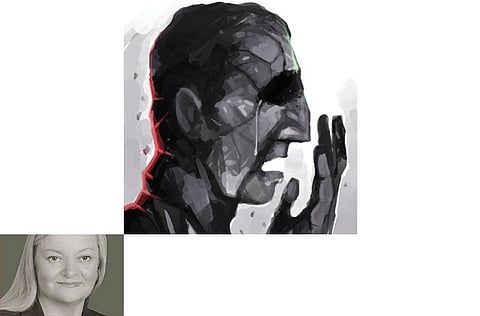Syria’s rebels are cut from Al Assad’s cloth
Doubts linger over role of Syrian opposition in a post-Al Assad scenario

There is little doubt that Bashar Al Assad’s days in office are numbered. His “reign” is unsustainable. A war criminal that has not flinched from imprisoning, torturing, dismembering and killing tens of thousands of the very people he is duty-bound to protect is not fit for purpose. Even if opposition forces are not up to the task of besting the Syrian military whose loyalty Al Assad still enjoys, western intervention may be on the cards.
President Barack Obama has little appetite for becoming a war president or facing off against Syria’s ally Russia as he battles to retain the Oval Office, but if he walks off with the prize today, his resolve to end the Syrian bloodbath could harden. Moreover, there are signs that Israel, France and the UK are on the same page. As reported by the Debka File, a website with links to Mossad: “US, British and French Forces that might be needed for military action are already in place … while Israel’s Defence Forces are on standby” awaiting “orders to go forward after first being told which way to jump — Syria or Iran.”
Western powers are not known for being altruistic and rarely launch military action on purely humanitarian grounds, but with Al Assad opening his doors to Hezbollah fighters and Iran’s Revolutionary Guards, a strategic game changer is likely. Last month, the head of the Islamic Republic’s elite force, General Mohammad Ali Jafari, admitted members of his corps are in the country while warning Tehran’s military pact with Damascus would necessitate Iran’s military involvement were Syria to come under foreign attack.
However, in the light of Iran’s financial constraints caused by crippling US and European Union sanctions and its suspension of uranium enrichment as a goodwill gesture in the run-up to planned talks with the US, it is doubtful Iran is in a position to make good on General Jafari’s threat, especially when Iran-obsessed Benjamin Netanyahu would be gifted with a long-awaited excuse to strike at Iran’s nuclear sites. Al Assad and his cronies will be sent packing one way or another and probably sooner than later, but what of the day after? Who will come in their stead? On this, the picture is extremely confused.
The aftermath of the Arab Spring has taught us that change is not necessarily a panacea for a country’s ills. Armed militias are terrorising Libyan cities and there are calls throughout the oil-rich eastern part of the country for the creation of an autonomous region called Cyrenaica.
In Tunisia, hard-won freedom is being eroded by the continuation of emergency laws, an Islamist government that is not as moderate as it purported to be when attempting to garner votes — and attacks by Salafists. It is a similar story in Egypt where the Muslim Brotherhood is pushing for a Sharia-based constitution and wishes to impose its social mores on an eclectic population, beginning with the early closure of shops and cafes so Egyptians can sleep early and wake up refreshed for work. “They’ll be doling out valium to put us to sleep next,” one Egyptian protester commented.
In Syria, there has always been a question mark over who makes up the fragmented Syrian opposition that until now has been backed by the US and its allies in Europe and the Middle East in terms of cash and weapons. Those who oppose Al Assad are politically and ideologically divided. Worse, their ranks have been infiltrated by foreign extremists and opportunistic Al Qaida explosives experts.
Atrocities committed by rebels were little more than hushed whispers earlier on, but recent video footage showing opposition fighters executing soldiers following their surrender in the town of Saraqeb has brought such accusations to a head. “At this point, it looks very like a war crime,” said a spokesman for the UN High Commissioner for Human Rights.” In August, masked members of the Free Syrian Army were caught on a mobile phone camera, dragging four half-naked bloodied men to a schoolyard where they were mown down with AK-47s.
In Washington, the penny has finally dropped that the US cannot be seen supporting any anti-Al Assad entity without knowing their affiliations or credentials. During a visit to the Croatian capital, the US Secretary of State, Hillary Clinton, announced the US was withdrawing its backing of the Syrian National Council (SNC) because “it can no longer be viewed as the visible leader of the opposition”. She said the US was organising a shake-up of the rebel front, with the implication that Washington intended to cherry-pick the Al Assad regime’s successors.
Last Sunday, various opposition groups were scheduled to meet in Doha to discuss forming a unified opposition that could replace the SNC which has accused the US of “sowing the seeds of division”. Clinton further made it clear that the UN’s efforts to bring about a political solution to the conflict are a waste of time, adding the US “cannot and will not wait”.
The potential for a US puppet regime installed in Damascus is growing likely. In that case, the freedom that Syrians so covet will be illusionary but, perhaps, even that would be an improvement on what they have now.
Linda S. Heard is a specialist writer on Middle East affairs. She can be contacted at lheard@gulfnews.com



